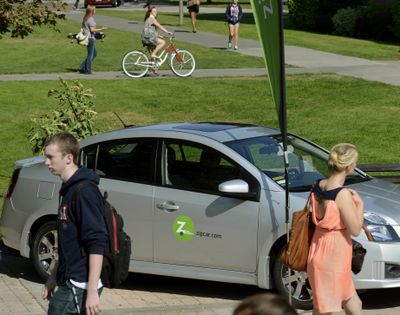Road planning should change with definition of mobility, group says

As state lawmakers ponder the funding of transportation in Washington, an advocacy organization is calling for them to look to the future as they make their decisions.
Young people, especially those in urban areas, are abandoning the old dream of mobility – owning a vehicle – according to a new study put out by WashPIRG, a public interest research group. Instead, they are embracing mobile technology, public transit and vehicle sharing services.
“Our tax dollars should reflect that change,” said Chris Esh, a policy associate for WashPIRG.
“The millennial generation is really prioritizing technology,” he said. They would rather pay a mobile phone bill than a car insurance bill.
The millennials are people born from 1982 to 2002, now mainly in their teens and 20s.
As of 2012, more than 800,000 people across the country had joined car-sharing services, including Zipcar and Car2Go. Zipcar brought its service to Gonzaga University last year.
Seattle saw 18,000 sign-ups in the first three months after Car2Go arrived there.
In King County, a bike share program is expected to start next year.
“For baby boomers, driving your car represented freedom and spontaneity. But today – especially for younger people – owning a car increasingly represents big expenses and parking hassles,” Esh said in a summary of the report.
In August, WashPIRG reported that Washington drivers have cut miles driven per person by 5.5 percent over the past eight years. Per-person miles peaked in 1999, the organization said. That decline is being seen nationally as well.
Mobility is increasingly defined by smartphones and tablets, Esh said.
A change in car ownership and driving patterns has led to a decrease in the amount of gasoline Washington residents are purchasing, in turn reducing the gas tax collections available for transportation spending.
Nevertheless, Spokane community leaders have said their top priority for transportation funding continues to be completion of the North Spokane Corridor.
City: Drivers should prepare for winter
The obstruction notice the city of Spokane released for this week is enough to give you the chills.
“City crews ready for winter road duties,” reads the lead item.
The item concludes, “With weather being unpredictable, we ask drivers to also be prepared for winter driving conditions at all times as well.”
Spokane street closures
In the city of Spokane, Stevens Street will have two lanes closed for utility work between Main and Riverside avenues Thursday through Oct. 14.
Sprague Avenue from Washington to Bernard streets will have two lanes closed on Friday from 6 a.m. to 3 p.m. for construction work.
Also, the 100 block of East Spokane Falls Boulevard will close on Friday through Oct. 25 for construction of a new concrete intersection.
A summer of construction is at or near an end on Crestline Avenue, Rockwood Boulevard and 14th Avenue. Crestline and Rockwood will soon be fully opened. Paving is finished on 14th.
Work continues on portions of Third Avenue, the Greene Street Bridge, Euclid Avenue and Post Street downtown.
Spokane Valley work
In Spokane Valley, lane restrictions are in place on 14th Avenue from Custer Street to Carnahan Road.
Adams Road from Trent to Wellesley avenues remains closed for sidewalk work through the end of October.
Work continues on Indiana Avenue west of Mirabeau Parkway.
Sullivan Road at the Spokane River bridges will be reduced to a single lane each way starting today through late October.